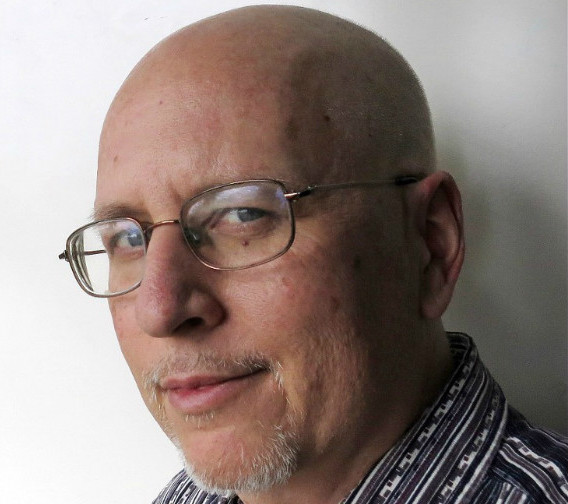David Weaver -- a.k.a. "Davey B. Gravey" -- converted a trailer into a mobile theater. Kara Pearson Gwinn
A still from the sci-fi mini-epic, "Moonglow."
Davey B. Gravey hawks his mini-spectacle to potential patrons. Kara Pearson Gwinn
Filmgoers get an intimate presentation hosted by a daffy character. Kara Pearson Gwinn
Weaver was first exposed to Super 8 while studying film in college. Gregory Dauerer
Movie goers laugh during "Alice in Wonderland." Kara Pearson Gwinn
David B. Weaver (a.k.a. "Davey B. Gravey") is an auteur working in the retro medium of Super 8 film, exhibiting his celluloid creation, Moonglow, at his very own Tiny Cinema.
Compare Weaver with another champion of analog film rather than digital: Director Quentin Tarantino. Tarantino's recent film The Hateful Eight opened big -- literally -- with screenings of massive 70mm prints (of higher visual quality than a standard 35mm projection) to crowds across the country.
In contrast, Weaver's silent film Moonglow was shot on dinky 8mm (the onetime popular home movie format), and the only place to see Weaver's short film is within the cargo trailer that he's converted into a mobile, four-seat theater.
So much for the classic moviegoing experience.
"The Tiny Cinema is sort of an antithesis to that experience," Weaver happily says of his setup, which includes a tiny 4' x 5' screen. "It's purposefully small."
Micro-moviemaking![]() Davey B. Gravey hawks his mini-spectacle to potential patrons.
What filmgoers do get at the T
Davey B. Gravey hawks his mini-spectacle to potential patrons.
What filmgoers do get at the Tiny Cinema is an intimate, whiz-bang presentation hosted by a daffy character portrayed by Weaver: "Davey B. Gravey." He hawks his mini-spectacle to potential ticket-buyers at festivals, art galleries and assorted gatherings. "Gravey" is the barker ("Hey, you! Step right up, see a tiny movie!"), the usher, the projectionist and the sound accompanist -- playing electric ukulele as well as a touchpad keyboard. Weaver describes the soundtrack he performs live as "sort of folksy, sort of electronic."
Moonglow is an
E.T.-esque mini-epic of a film, complete with starstruck kids, "goofy, old-school practical effects," and an alien that's been described as "a disco ball, anglerfish,
Creature from the Black Lagoon." (Spoiler alert: The film's title is a cutesy double entendre.)
Weaver's cinema magic lasts less than ten minutes, before the film reaches the end of its spool. Weaver puts down his ukulele and ushers in the next audience of four. Given that house capacity -- as well as the interest in Weaver's spectacle -- it should come as no surprise that at a recent Leon art gallery appearance there was a long line queued up outside the trailer door to see the film.
Exiting patrons called Moonglow "whimsical" and "fantastic!" The mothers of two tiny babies assured a reporter that their infants enjoyed the film, as well (although only one tyke appeared to be actually awake upon leaving the theater).
Analog attraction![]() Filmgoers get an intimate presentation hosted by a daffy character.
Weaver, 25, was first exposed to Super 8
Filmgoers get an intimate presentation hosted by a daffy character.
Weaver, 25, was first exposed to Super 8 by a friend while studying film at Emerson College in Boston. "It kind of just blew my mind," says Weaver, who grew up in Boulder. "It was really striking hearing the photochemical celluloid passing through a projector at vaguely 24 frames a second, light passing through that and a lens and [the image] hitting a screen and bouncing back. It just looks really special, a really different experience to a scan of Super 8 on computer, watching it on YouTube." (Weaver is representative of a generation that has already taken a renewed interest in old-school analog audio formats like vinyl record albums and cassette tapes.)
Some film directors loathe the eventual havoc that a film projector plays on prints of their work, welcoming the cleanliness and crispness of digital innovations. But Weaver goes with the graininess, so to speak: Those scrapes and blobs -- that "dirtiness" -- become part of the charm. There aren't multiple prints of Moonglow. Embracing the ephemeral, Weaver says, "It's the one copy that will ever exist on film."
Weaver says his accomplishment is no small feat: There are a lot of arduous hours involved in producing, editing, and then exhibiting his Tiny Cinema movie experience. While the same film strip that he shoots in the camera ultimately winds up as the final product that runs through the projector, Weaver does use technology to achieve his pre-modern goal: He makes a digital edit of the movie on a computer first, and then he uses that as "a roadmap to work through the raw footage" that he then painstakingly tapes together by hand.
"It's very time-consuming," says "Davey B. Gravey" to a lecture audience, before injecting a huge descriptor into his explanation, "but in the end, a
million percent worth it."
Check out Davey B. Gravey's Tiny Cinema June 29 and July 13 at the Alamo Drafthouse Cinema in Littleton; June 30 at The Plaza at DIA; and July 10 at the Church of Coen at Syntax Physic Opera in Denver.
Enjoy this story?
Sign up for free solutions-based reporting in your inbox each week.
 Gregory Daurer
Gregory Daurer is a Denver-based freelance writer and singer-songwriter, whose credits include
5280,
Westword,
Salon,
Draft and
High Times. He's also authored the novel
A Western Capitol Hill.